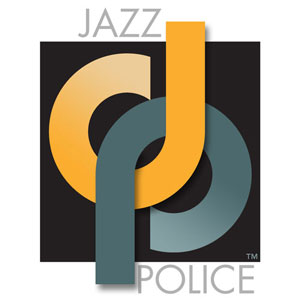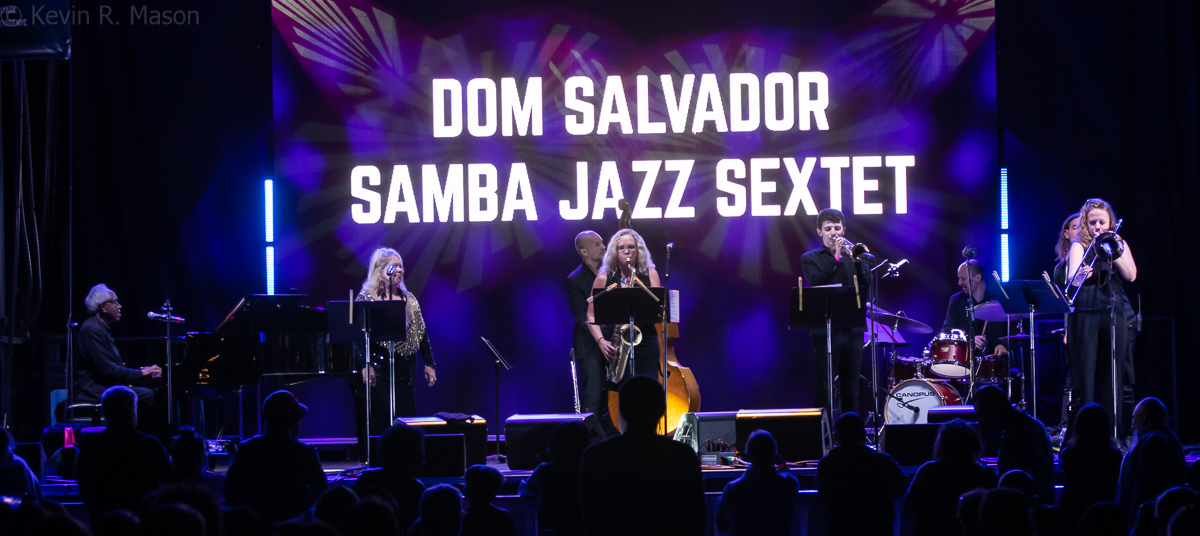
On Saturday, September 4, SummerStage and the City Parks Foundation, in association with the 25th Brazilian Film Festival, presented the Dom Salvador Samba Jazz Sextet. The event took place at Rumsey Playfield in NYC’s Central Park on a gorgeous late-summer evening.
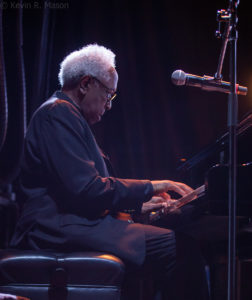
Acclaimed pianist/composer/arranger Dom Salvador was born Salvador da Silva Filhos in Rio Claro, Brazil in 1938. Often called “The Godfather of Brazilian Soul,” Salvador was an early creative force in the genres of bossa nova and samba-jazz. Although he is not a household name, he is a humble and incredibly talented artist who is on some music lovers’ radars and venerated by numerous musicians and those familiar with his Brazilian musical legacy. Born into a musical family, Salvador is one of 11 kids, and initially his brother Emilio taught him drums. Later Emilio got a teaching job that would lead Dom to an opportunity to study the piano (including classical) at the school, an instrument Dom didn’t love at first. Eventually, the great teachers at the school warmed Salvador up to the piano. Proving to be a child prodigy, his virtuosity got him club gigs in bands and orchestras at a very young age. As he progressed, he later became an accomplished accompanist and soloist. While in Rio de Janeiro, after participating in a jam session at a club in his favorite spot, Beco das Garrafas (Alley of the Bottles), he met guitarist and vocalist Toninho Horta and was invited to play with his group.
After much success, Salvador formed his own Salvador Trio with bassist Edson Lobo, and drummer Victor Manga, producing an album, Salvador Trio, released in 1965 by Mocambo. He also delved into a soul, funk, and jazz mixture with his band Abolição, formed during the Black Rio Movement, and they produced an album titled Som, Sangue e Raça in 1971 on the CBS label. Dom’s Rio 65 Trio, with drummer Edison Machado and bassist Sérgio Barroso, was a perfect combination of their collective experiences and creativity in bossa nova and samba-jazz. Two classic albums resulted from their union, Rio 65 Trio (1965) and A Hora e Vez da M.P.M. (1966), both released by Philips. Salvador’s arrangements and compositional genius in bossa nova and samba-jazz were clearly demonstrated in concert with the signature samba no prato drumming style of the skillful Machado and the steady anchor of Barroso’s bass on these albums. The Rio 65 Trio performed a 50th anniversary Carnegie Hall concert in Zankel Hall on November 28, 2015, dedicated to the memory of Edison Machado, who passed in 1990 and was replaced by Trio da Paz’s founding member, Brazilian drummer Duduka Da Fonseca for the concert. Duduka was greatly influenced as a teen by Machado and the Rio 65 Trio’s sound, and he knew their music like his own. There was an album produced from that magical anniversary concert on CD and can be streamed, Dom Salvador & Rio 65 Trio (Live in Zankel Hall at Carnegie Hall) licensed exclusively to Universal Music International.
Salvador left Brazil, nine years after its 1964 military coup d’état, making New York his new home. For the past 44 years, Dom Salvador has been the resident pianist at The River Café in Brooklyn, New York, and this is probably the longest residency ever of anyone in New York. In comparison, Bobby Short’s residency at Café Carlyle lasted 35 years. Dom has recorded during these years as both a leader and a sideman, and he’s played at several jazz clubs in his adopted hometown of New York City. Throughout his career, Salvador has performed with numerous artists, including flutists Herbie Mann and Lloyd McNeill, acclaimed percussionists Portinho and Reubens Bassini, guitarist/vocalist Jorge Ben, and iconic vocalists Elis Regina and Elza Soares, just to name a few. Dom Salvador has been a true hidden treasure for decades in New York and the music world.
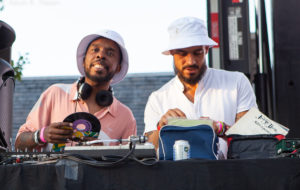
The evening’s festivities started with an hour-long set of exhilarating, recorded Latin music spun by DJ Nyack and Eduardo Brechó. Then, Paula Abreu, Associate Director of Programming for SummerStage took the stage and said, “Welcome to Capitol One/City Parks Foundation SummerStage…So, I’m beyond honored and thrilled and excited for the opportunity to present this show tonight for you guys. After being ‘digital only’ for a year, we’re so excited to have it back here in Central Park. Tonight, we have a special show with the Dom Salvador Samba Jazz Sextet, and the movie Dom Salvador and Abolition. Thank you so much to my favorite DJs, DJ Nyack and Eduardo Brechó, thank you! And thank you so much for the partnership with Inffinto Brazilian Film Festival. So good to have you in the house tonight as well.” Then, Paula said, “We want everyone to have a safe and enjoyable experience here at SummerStage.” She encouraged people to remain masked and stay socially distanced, for extra safety in addition to the requirement of proof of vaccination.
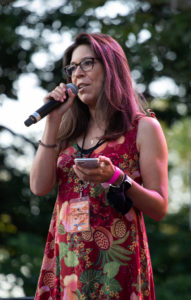
Ms. Abreu continued, “We’d also like to thank Rooftop Films for their partnership this season, and I send special thanks to the staff of the Parks Department, and to all our SummerStage members. Thank you so much. Finally, we acknowledge that we are currently standing on native land that has been stewarded and cared for by generations of Lanape people. In the spirit of honoring our past, and the people who inhabited this land before us and their traditions, we offer our recognition and our gratitude to all indigenous people. We are thrilled to host this tonight, and I am personally very honored and proud to have this show tonight. Thank you so much for being here and enjoy the show.” Then, two documentary films were screened for the audience. Dominic Davis, Senior Programmer at Rooftop Films introduced a short film, The Orphan, about a Brazilian orphan who suffered through several unsuccessful adoptions. The film packed a lot into 15 minutes, and the story was based on true events. Then, Viviane Bressane Spinelli, Director and Founder of Inffinito Brazilian Film Festival introduced Lilka Hara and Artur Ratton, the directors of the documentary Dom Salvador and Abolition, and the directors thanked the audience for coming.
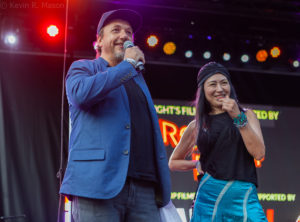
On the movie’s website, www.filmfreeway.com/DomSalvadorandAbolition, the Director’s Statement is as follows:
“An immersive musical journey, Dom Salvador and Abolition is the untold story of Dom Salvador, an Afro-Brazilian musician who found a home in New York. Departing from Brazil at the height of its military dictatorship, Salvador left behind an enormous shadow. As the godfather of Brazilian soul, he helped create Bossa Nova while announcing the arrival of Blackness through his band Abolição.
Octogenarian Salvador darts through the city, memories emerging with each step. A veteran musician whose humble resilience is revealed in captivating moments; rifling through vinyl at a record shop, putting up shows in jazz clubs, performing at Carnegie Hall and a permanent gig at the scenic River Café.”
The film covered many aspects of Salvador’s life, and showed that, in addition to performing in his bands in the Sixties and Seventies, Dom Salvador was a session player, who contributed to over 1000 recordings. There was footage of a performance at the famed NYC jazz club, The Metropolitan Room, which included “The Black Boys” and “Samba Rock.” Mike Davis of Academy Records discussed some unreleased recordings from the time when Dom served as Harry Belafonte’s Musical Director on his European tour, which included performing for Queen Elizabeth II’s 25th Jubilee. Harry Belafonte himself appeared in the film, and he discussed the time they worked together. Michael “Buzzy” O’Keefe, owner of The River Café, said of Salvador, “He can do whatever he wants.”
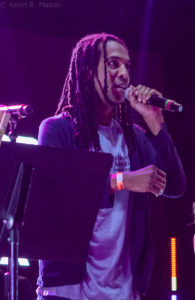
Salvador’s time with the popular Rio 65 Trio and the Abolição band with his wife, singer Mariá Ignes Vieira was discussed. There was also touching coverage of the difficulties Dom and his family faced when Mariá was stricken with dementia. The documentary included incisive comments from Salvador’s niece Cida, vocalist Elza Soares, pianist/singer Ed Motta, saxophonist Dick Oatts, and singer/actor Tony Tornado, who talked about collaborating with Salvador and expressed how much Dom had helped him. Salvador spoke of how meaningful it was for him to be a part of the great Pixinguinha’s last album, Som Pixinguinha, in 1971 on EMI Records. When Dom visited an old record shop in the documentary, he reminisced about various albums and the musicians who played on them. Portuguese was spoken during many of the interviews throughout the documentary with English subtitles. Salvador’s music, influences, creative process, history, and still photos were wonderfully interwoven into this noteworthy story. The film was an interesting and a very personal look at an artist who deserves to be much better known.
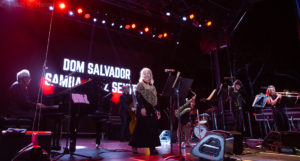
DJ Greg Caz introduced Dom Salvador with many accolades, noting that Salvador is finally getting some much-overdue recognition. Caz also praised the documentary film and the directors. The Dom Salvador Samba Jazz Sextet began their set with a wonderfully swinging number, “Suddenly” that featured several great melodic solos, and really got the crowd going! Salvador was joined onstage by trumpeter David Sneider, saxophonist/flutist Laura Dreyer, bassist Gili Lopes, trombonist Alevtina Wilcox, drummer Graciliano Zambonin, and vocalist Raquel Lima. Even at 83 years old, behind the piano, Dom has not lost one step, playing beautiful chords and improvised melodies. It would be easy to imagine a man more than half his age on stage, with the vigor and musicality he still plays with. The support he received from his cohorts was excellent, and the group was really on point in every way, especially on the wonderful samba-jazz infused “Meu Fraco é Café Forte.” On the delightful and percussive “Moeda, Reza, e Cor,” written by Dom Salvador and Marco Versiani, the band played Salvador’s arrangements in an exceptionally cohesive manner, each beautifully communicating with their fellow musicians under the assured leadership of Salvador.
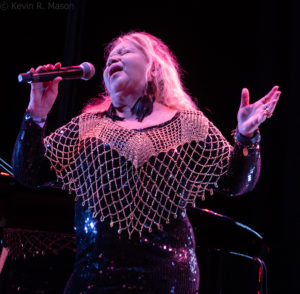
Raquel Lima’s vocal talents then added an emotive atmosphere to the proceedings on songs like Salvador’s sensuous hit “Hei! Você,” and the moving “Saudosa Maloca,” a composition by Brazilian singer/composer Adoniran Barbosa. Raquel told the audience, “What beautiful people! Thank you for this night.” Then, Salvador took to the microphone and addressed the crowd. “I guess I have to say something. I’m so happy to see all these people here…Also, the weather was perfect today. This band is really something!”
This was one outstanding night of samba-jazz, bossa nova, and Latin Jazz. At the end, most of the audience members were out of their seats, dancing their hearts out to the scintillating music. Even socially distancing, a great time was had by all!
Sponsorship
Capitol One Bank was the title sponsor that was instrumental in making this event possible. Other sponsors include: Con Edison, Bloomberg Philanthropies, Union Beer Distributors, United Airlines, Two Robbers Hard Seltzer, Bell’s Inspired Brewing, Wölffer 139 Cider, United Airlines, Green Mountain Energy, and Sierra Nevada.
SummerStage is the largest free outdoor performing arts festival in New York City and will be beginning its new season on June 4. For more information, go to www.summerstage.org.
